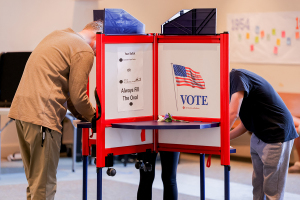1 in 7 Americans plan to move if their preferred presidential candidate loses: poll

A substantial share of Americans say they plan to move out of their state or even the country if the presidential candidate they oppose wins the election, according to a new poll.
A survey released last week by StorageUnits.com sampled the opinions of 1,968 Americans who plan to support either former President Donald Trump or Vice President Kamala Harris in the 2024 presidential election. The poll was conducted on July 22, the day after President Joe Biden ended his bid for the Democrat nomination for president and endorsed Harris.
Overall, 15% of respondents said they planned to leave their state and/or the U.S. if the candidate they oppose in the 2024 presidential election wins. Nineteen percent of Harris' supporters planned to relocate, as did 12% of Trump supporters.
“Of Harris voters considering moving, 62% are thinking about moving to a state and 74% to a country that better aligns with their political views,” the survey found. “Of Trump voters considering moving, 67% are thinking about moving to a state and 60% to a country that better aligns with their political views.”
The most commonly cited concerns about a Trump presidency that would prompt Harris voters to relocate include increased social inequality (62%), a federal abortion ban (60%), the overturning of progressive rights (58%) and a lack of gun regulation (53%). Meanwhile, 62% of Trump voters thinking of relocating listed both the higher cost of living and taxes as their biggest concerns about a Harris presidency.
As for states that Harris voters would like to move to if Trump wins the election, 13% said they wanted to relocate to New Jersey followed by 8% who preferred California and 7% who expressed an interest in moving to New York. Meanwhile, 38% of Harris voters who plan on leaving the country if Trump wins the election would make Canada their new home followed by 16% who picked the United Kingdom and 7% who favored moving to Mexico.
Fifteen percent of Trump voters thinking of moving to a place that better reflects their values if Harris wins the election would choose Florida as their destination state. Thirteen percent said the same about California, while 9% would prefer to move to Texas.
The countries Trump voters see as destinations if Harris wins are the exact same ones chosen by Harris voters. Twenty-four percent of Trump voters who want to move would go to Canada if Harris wins, while 13% would pick the United Kingdom and 11% would select Mexico.
Commenting on the results of the survey, real estate expert James Heartquist asserted: “The division within the United States has become increasingly pronounced in recent years. This polarization is evident in the way people are aligning themselves with political ideologies, often to the extent of considering relocation. The reasons for this division are multifaceted, including differing views on social issues, economic policies and governance styles.”
“This polarization is not just a political phenomenon but also a social one, affecting how communities interact and how individuals perceive their place within the country,” he added. “The stakes of the 2024 election are incredibly high. The outcome will shape the country’s direction on critical issues such as climate change, healthcare, immigration, and economic inequality. The polarization is so intense that some Americans are willing to uproot their lives to live in a place that aligns more closely with their political beliefs.”
Heartquist also predicted that “the real estate market is likely to be significantly impacted by this political migration,” forecasting “increased demand in certain areas and decreased demand in others” that could end up “driving up property prices in politically favorable regions.”
He further maintained that “policy changes proposed by presidential candidates can influence market sentiment” by proposing “changes in tax laws or housing regulations.”
Even as Harris has replaced Biden as the Democrats’ presumptive nominee for president, polarization surrounding the major party candidates continues. Both candidates find themselves underwater when it comes to favorability ratings among the American public.
The RealClearPolitics average of polls measuring the candidates’ favorability ratings finds that 50.9% of Americans have an unfavorable view of Harris compared to 41.7% who have a favorable view of her, indicating a net disapproval rating of 9.2 percentage points.
Meanwhile, 43.8% of Americans view Trump favorably, while 52.5% have an unfavorable opinion of him. At 8.7 percentage points, Trump’s net disapproval rating is slightly lower than Harris.’
Both Trump and Harris have much higher favorability ratings than Biden, who has a net disapproval rating of 16.1% percentage points. Just 39.8% of Americans have a favorable opinion of Biden compared to 55.9% who have the opposite view of the president.
According to the RealClearPolitics average of polls taken over the past three weeks, 47.9% of Americans plan to back Trump in the election, while 46.2% prefer Harris, a difference of 1.7 percentage points.
In a five-way race featuring Trump and Harris as well as independent candidates Robert F. Kennedy Jr. and Cornel West and Green Party candidate Jill Stein, 44.5% of voters plan to back Trump, while 42.7% would back Harris. Kennedy’s support is measured at 5.8%, followed by Stein at 1.1% and West at 0.8%.
The RealClearPolitics “No Toss Ups Map,” which predicts the outcome of the 2024 presidential election based on polling averages at the state level, shows Trump winning 312 electoral votes to Harris’ 226. This makes the former president a slight favorite to win the White House.
Ryan Foley is a reporter for The Christian Post. He can be reached at: ryan.foley@christianpost.com




























